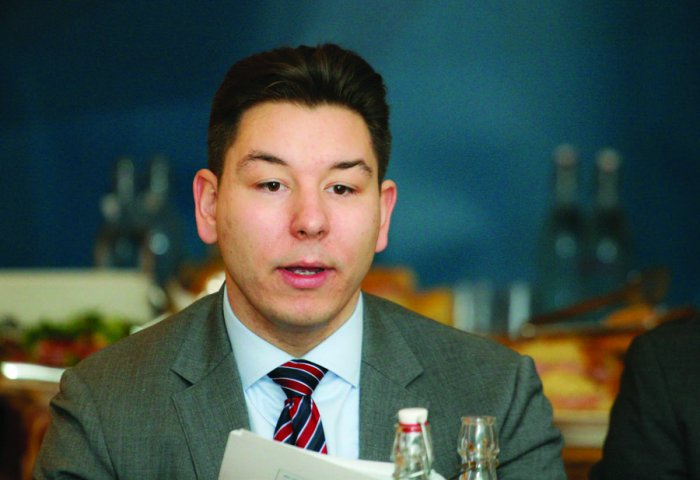Buy OTP and MOL in 2019, Equilor Says

Amid slowing economic growth and rising inflation foreseen for Hungary in 2019, equity investors are in search of the next big story in the country. Counting only blue chip papers on the Budapest Stock Exchange, brokerage Equilor recommends buying into OTP and MOL but staying away from Magyar Telekom.
Lajos Török, Equilor head analyst.
OTP Bank’s shares have been hovering around an all-time high of HUF 11,900 since it announced the acquisition of a Bulgarian target and after record-high net profits in the third quarter of 2018. A favorable economic background, a further decrease in the Hungarian banking sector tax, strengthening lending activity in the region and a slow turnaround for a higher interest rate environment being the main drivers.
“We expect OTP Bank to outperform its competitors on the stock exchange,” Equilor head analyst Lajos Török said at a press conference on January 24.
OTP’s Bulgarian unit DSK Bank announced the closing of the acquisition of the Bulgarian unit of France’s Société Générale Group on January 15, and OTP chairman-CEO Sándor Csányi said the bank would keep its eyes peeled for further such possibilities. Among possible target countries, Slovenia and Balkan states such as Bosnia or Macedonia seem to be the natural choice, with Société Générale slowly but surely giving up its foothold in the region.
To be sure, risks related to OTP’s operations are also plentiful, especially regarding country-specific regulations such as the surprise Romanian banking tax, or sanctions in Russia. In addition, OTP’s wage-related expenses are rising due to a narrowing pool of available professionals. Equilor, nevertheless, expects news related to acquisitions and the bank’s increasing weight in the region to drive the share price to new heights in 2019, and therefore recommends buying the stock.
Hungary-based regional oil and gas firm MOL is another favorable target for equity investment this year, the brokerage reckons. After a strong performance in the first nine months of 2018, the company’s stocks are trading minimally below HUF 3,328, its highest since 2007. While results for the full year are due to be published only on February 22, Equilor expects the year to have been an overall success for MOL, despite a drop in refinery margins.

Bálint Szécsényi, CEO of Equilor.
Reaching its Goals
The company is on a path towards reaching its 2030 goals, strengthening is presence in the petrochemical market to diversify its portfolio amid decreasing oil prices, Equilor says. MOL, in its latest investor presentation in London, raised its net profit outlook by 10% for the 2019-2021 period, and also for 2021-2023. Risks involved here include a prolonged weakness in oil prices and a slowing global economy that would, in turn, make its mark on petrochemical and refinery margins. Nevertheless, the company intends to raise its oil stock via acquisitions or organically, continuing drilling in its Norwegian fields.
MOL’s Croatian refinery, INA, also remains a question mark, with the story likely dragging on this year as well. MOL has signaled its willingness to sell its stake at a fair price. The ongoing lawsuit that MOL filed against the Croatian government is nearing an end. But recent regulatory steps in Croatia may indicate that hopes MOL’s stake in INA would be subject of a state buyout could be trashed and the case could, again, stall.
“This is, indeed, a never-ending story, so to say, and risks continue to loom,” Török said.
Magyar Telekom, the telecommunications paper on the BSE, should be avoided in 2019, Equilor says. The fundamentals currently do not underpin the share price that saw a major rally late last year on buyout rumors. The stock reached HUF 465 earlier in January, the highest in 11 months.
These rumors have proved unfounded, but investors are seemingly still hoping for related news and expect its German stakeholder Deutsche Telekom to sell its ownership in Hungary’s largest telco.
“We have heard the rumors. We do not think a buyout is likely to take place this year,” Török said.
Yield versus the risks involved is relatively low, Equilor says, with competition on the market increasing with the UPC-Vodafone fusion, as well as Digi having acquired Invitel. Another factor that has marred profitability is high personnel costs, while the increasing interest rate environment would also be a negative for the paper, whose dividend yield is traditionally compared to government bond yields.
The company paid HUF 25 per share in dividends last year and Equilor expects the rate to remain unchanged this year, since Magyar Telekom needs to put money aside for coming frequency tenders in Hungary. The government is set to announce tenders for 5G frequencies, which ensures immediate data transfer, and the technology will likely help replace the landlines that have been used thus far for data protection.

Szilárd Buró, Financial and Innovation Director at Equilor.
Neutral Target
Equilor considers Gedeon Richter, the Budapest-based international pharmaceutical company, a neutral investment target in 2019. Last year the company had its ups and downs, with the operations of its Romanian wholesaler, Pharmafarm, temporarily suspended and issues around its Esmya that ate into profits for the whole 2018.
“It’s a big positive that Pharmafarm is operating again. The string of unlucky events may be over at Richter; we will take a careful look at this year’s performance,” Török noted.
Richter is set to publish 2018 results on February 7, when exact figures of the revenue fallout on the Romanian suspension should be published. The stock price rose to as high as HUF 6,020 in January, the highest since March 2018, which could remain around current levels this year.
Equilor expects a further increase after the publication of the 2018 results if there is a lower-than-expected drop in revenues and profits, and on any favorable news around the drug Esmya, used to treat uterine fibroids in adult women.
On the upside, the company’s own Cariprazine, a drug approved in the United States under the brand name Vraylar for treating bipolar depression, has been a success. The company may be well over the shocks that hit operations last year and may return to business as usual in 2019.
SUPPORT THE BUDAPEST BUSINESS JOURNAL
Producing journalism that is worthy of the name is a costly business. For 27 years, the publishers, editors and reporters of the Budapest Business Journal have striven to bring you business news that works, information that you can trust, that is factual, accurate and presented without fear or favor.
Newspaper organizations across the globe have struggled to find a business model that allows them to continue to excel, without compromising their ability to perform. Most recently, some have experimented with the idea of involving their most important stakeholders, their readers.
We would like to offer that same opportunity to our readers. We would like to invite you to help us deliver the quality business journalism you require. Hit our Support the BBJ button and you can choose the how much and how often you send us your contributions.








